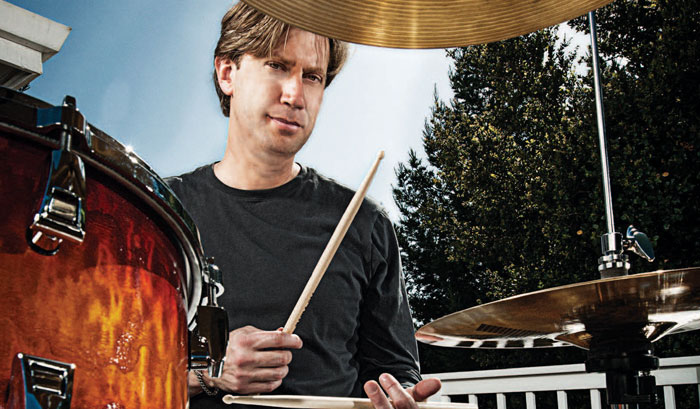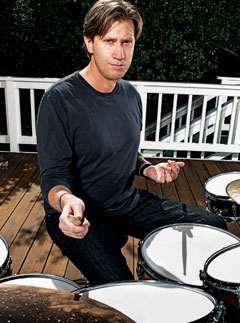


Any student of jazz history can tell you how most big bands dried up soon after World War II, victims of changing taste and the economic challenges. They were dinosaurs in the era of bebop and rock and roll.
But don't try telling that to Tommy Igoe, the drummer/bandleader who rattles the walls of San Francisco's chic Rrazz Room every Monday with the 15-piece Tommy Igoe Big Band. It's a West Coast sequel to Igoe's long-running residency at New York's Birdland jazz club.
"When I got together with the musicians," recalls the recently transplanted New Jersey native, "I explained that I had zero interest in doing anything 'good' with a big band. The world needs another 'good' band like it needs another hole in the head. The only thing that interests me is doing something mind-blowingly spectacular. And after the musicians picked their jaws up off the floor after my rant, they were all on board." Igoe's new accomplices include a number of famed Bay Area players, including veterans of Santana, the Yellowjackets, the Doobie Brothers, Steely Dan, and Tower of Power.

Tommy has big band drumming in his blood. His father is the late Sonny Igoe, a famed drummer and music educator who played with Benny Goodman, Woody Herman, and other swing greats. Yet Tommy insists that his father never pressured him to become a musician. "If anything, he urged me not to. He knew music is a crazy business, and that even people with talent often don't succeed. But he also believed, as I do, that music isn't a job - it's a calling. If you're simply meant to be a musician, nothing anyone says will stop you. He'd always talk about how he couldn't tear me away from the drums as a kid, or how I'd look for any reason to go to a parade just so I could follow the drumline around."
Like his father, Tommy divides his time between gigging and teaching. He is the author of two modern classics of drum instruction, Groove Essentials (now in its second edition) and the DVD Great Hands for a Lifetime. He meets with students in his purpose-built recording studio. "I always send them home with a quality recording of themselves," he explains. "Sure, they can be painful to listen to, and sometimes the students say, 'I don't want to take it!' But I make them take it home, because I know they'll be able to listen to it in six months and hear how much they've improved."
Tommy keeps two Yamaha kits in his studio. His students play a new Stage Custom Birch kit. "It's an incredible instrument for the price, " says Tommy.
"It sounds unbelievably good, especially when it's miked up."
Meanwhile, Tommy teaches from behind a high-end PHX (Phoenix) kit. "It's an incredible instrument in every regard," he says. "It's exquisitely crafted, with gorgeous finishes, and the three different woods that make up the shells produce an incredible sound. Most drums sound pretty good on the initial attack if you tune them right, but after that attack, it's all about the overtones they produce. When you have a drumset where all the pieces resonate perfectly together like these do, it sounds like an instrument, instead of individual drums that just happen to be placed together. The PHX kit just has that 'voodoo.' It's hard to describe, but once you sit down and play it, you instantly get it." Tommy used the kit to record Eleven, his latest disc with the Birdland Big Band (available on iTunes and Amazon.com).
The PHX kit just has that 'voodoo.' It's hard to describe; but once you sit down and play it, you instantly get it.
For live shows Tommy prefers a more retro-flavored Club Custom kit. "It's a spectacular kit for intimate venues," he says. "It's a kapur wood kit inspired by vintage drums from the '60s, and it has that relatively dry, controlled sound you want when playing in a club. The kit never 'gets away from you,' though it has fantastic, full-range overtones. The tones you get from kapur wood are a little darker and rounder than, say, a modern maple kit. I'm loving the full, round sound I get from it."
Whether he's leading a band or guiding a student, Tommy advises against falling into the trap of playing solely for other players. "The notion of technique among drummers can become a gladiator mentality of faster, higher, louder. But no one cares how you hold the sticks except other drummers. And that's true with a lot of large-ensemble jazz, which seems to have been written only to impress musicians. But I love it when a listener who's never heard our kind of music before comes to a gig and gets blown away. They say, 'That's the most incredible thing I've ever heard. I had no idea that was jazz!'" Tommy chuckles. "Now that's what I call a compliment!"
(Photography Credit: Jay Blakesburg)
























